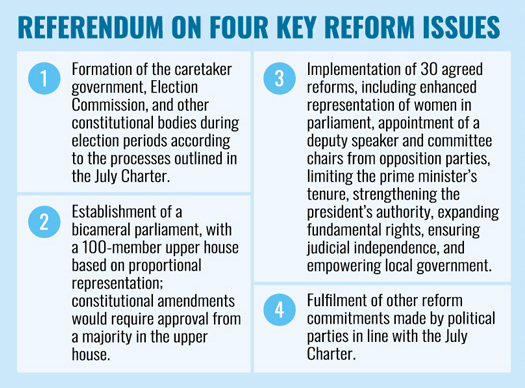
Published :
Updated :

Next national parliamentary election and referendum on constitutional reforms will be held concurrently the same day in early February 2026, Chief Adviser Prof Muhammad Yunus announced Thursday to break a political standoff.
 In a televised address to the nation in the afternoon, the head of post-uprising interim government said the decision followed approval for the 'July National Charter (Constitutional Reform) Implementation Order 2025' by the Advisory Council earlier in the day.
In a televised address to the nation in the afternoon, the head of post-uprising interim government said the decision followed approval for the 'July National Charter (Constitutional Reform) Implementation Order 2025' by the Advisory Council earlier in the day.
Meanwhile, the government published the gazette of the constitutional reform-implementation order later in the day that mandates the government for a referendum on the provisions of the July National Charter relating to a recast of the Constitution with some basic changes.
"After due consideration, we have decided that the national referendum will be held the same day as the parliamentary election, in the first half of February," Yunus says. "This will not in any way obstruct the reform process."
The Chief Adviser says necessary legislation would be enacted in due course to facilitate the referendum, which will seek the people's mandate on implementing the July National Charter - a landmark document agreed upon by major political parties through the Consensus Commission.
Yunus reads out the referendum question during his address, saying voters will express their views by casting a single 'yes' or 'no' vote on four key reform issues.
The four-point referendum questions are:
a. Formation of the caretaker government, Election Commission, and other constitutional bodies during election periods according to the processes outlined in the July Charter.
b. Establishment of a bicameral parliament, with a 100-member upper house based on proportional representation; constitutional amendments would require approval from a majority in the upper chamber.
c. Implementation of 30 agreed reforms, including enhanced representation of women in parliament, appointment of a deputy speaker and committee chairs from opposition parties, limiting the prime minister's tenures, strengthening the president's authority, expanding fundamental rights, ensuring judicial independence, and empowering local government.
d. Fulfillment of other reform commitments made by political parties in line with the July Charter.
"The people will give their opinion by a single vote of 'yes' or 'no' on these four issues," Yunus apprises the nation of the transition process.
If the majority votes 'yes', a Constitutional Reform Council composed of newly elected Members of Parliament will be formed. The council will have 180 working days from its first sitting to draft the constitutional amendments.
A 100-member upper chamber will then be constituted within 30 working days after the reforms are completed, based on the proportional share of votes obtained by political parties. Its tenure will coincide with that of the lower house.
The Chief Adviser adds that the July National Charter would be incorporated into the Constitution following the referendum.
"We established the interim government in August last year to the strength of the July People's Uprising. We have now arrived at a decisive juncture in fulfilling our mandate."
He mentions that the government's mission rests on three core objectives: bringing justice for the killings during the uprising, introducing a transparent and accountable democratic system through structural reforms, and transferring power to an elected government through a free and fair election.
The Chief Adviser reveals that the International Crimes Tribunal, set up to investigate the July killings, was preparing to deliver its first verdict soon, while several other cases were nearing completion. Trials for enforced disappearances were also under way for the first time in the country's history.
Yunus says the interim government has already carried out significant reforms - either independently or based on commission recommendations - in the judiciary, financial transparency, institutional capacity, digitisation, and anti-corruption measures.
"We have made substantial progress in implementing major reforms," he says, noting that some initiatives are still ongoing.
Reaffirming the government's commitment to a credible national poll, Yunus says, "The parliamentary election will take place in the first half of February. We are making every preparation to ensure that it is festive, participatory, and fair."
The Chief Adviser describes the July Charter as a "historic achievement" that reflects broad political consensus on 30 key reform proposals.
"While a few differences remain, these are not fundamental. The apparent disagreements among political parties are far less significant when one analyses the Charter carefully. This is a remarkable national achievement that will give our people the courage to move forward," he says, urging the parties to close ranks 'in national interest'.
With the approval of the July National Charter (Constitutional Reform) Implementation Order 2025, Yunus notes, Bangladesh has taken a decisive step toward transforming the consensus of the July Charter into binding constitutional reforms.
mirmostafiz@yahoo.com


 For all latest news, follow The Financial Express Google News channel.
For all latest news, follow The Financial Express Google News channel.